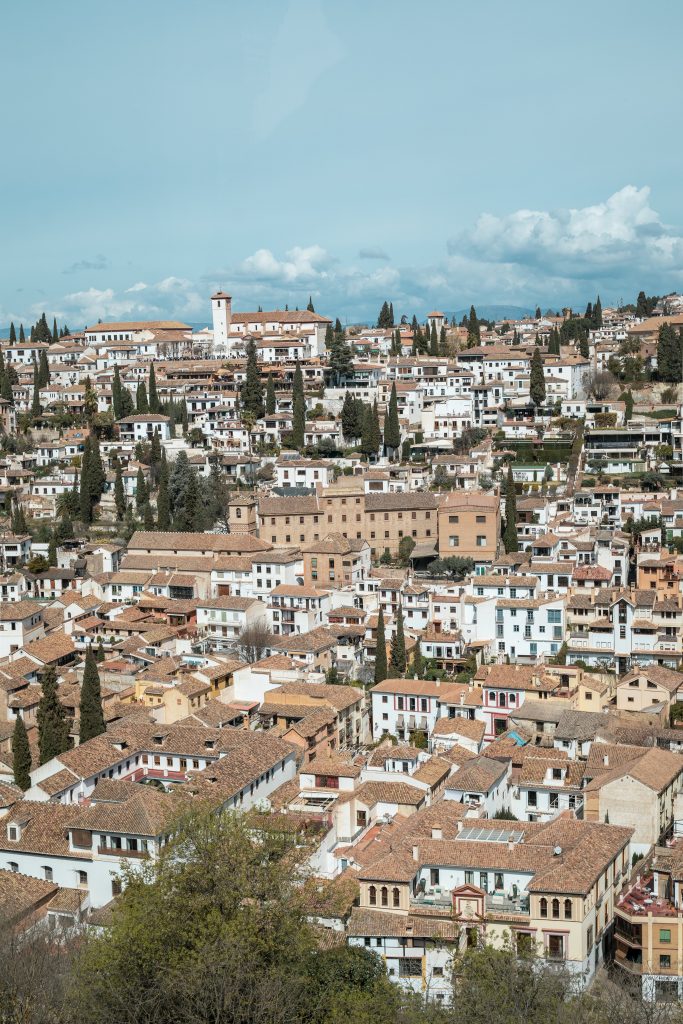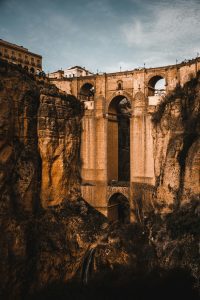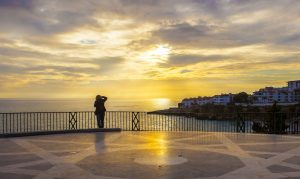The Albaicin neighborhood is the old Arab neighborhood of Granada.
Its whitewashed houses, the flowers on the balconies, and the narrow cobbled streets will make you feel like being in a small town in the middle of a city.
Are you ready to discover all Albaicin Secrets and get lost in its streets?
This article will show you the must-visit places in the Albaicin quarter.
El bañuelo
The Hammam al-Yawza or Baño del Nogal has been known by the diminutive Bañuelo since the end of the 19th century, due to being smaller than the royal baths of the Alhambra.
El Bañuelo is one of the best-preserved Arab baths in Spain and it is the oldest civil construction in the city of Granada.
Casa Horno Oro
Casa Horno Oro is a Moorish house. The original house, according to the constructions of the time, had only one floor, but in the 16th century, a second was added.
As in the majority of Islamic houses, all rooms and windows face toward the patio, an element central to family life, illuminating the rooms.
Since the expulsion of the Moors, the building became a neighborhood corral until it was acquired by the State.
Casa de Zafra
The Arab house of Zafra, constitutes one of the most relevant and best preserved examples of Andalusian residential architecture.
The House was built in the 14th century by an important family from the Nasrid kingdom, and nowadays is the headquarters of the Interpretation Center of this neighborhood. A set of exhibitions and interactive panels that invite the visitor to delve into the origins of the Muslim quarter.
Casa del Chapiz
This is one of the best-known Moorish houses to visit in the Albaicin. Actually are two diferent houses together.
The smaller one belonged to Hernán López and the main one to Lorenzo el Chapiz, from which it takes its name. These can be accessed both by the Cuesta del Chapiz and by the Camino del Sacromonte.
From the Casa de Chapiz you can see beautiful views of the Alhambra and the Darro valley. The second floor of the house is currently the School of Arab Studies of Granada.
Dar al-Horra Palace
Its name means the House of the Honest in Arabic.
This palace belonged to Sultana Aixa, who was the mother of the last Nasrid monarch of Granada, Boabdil.
As a result of the conquest of the Catholic Monarchs, it became a cloistered monastery. However, some of the original Arabic decoration has been maintained.
The main element of the building is a rectangular patio with a small pool. Some inscriptions carved into the plasterwork of the gazebo reinforce the private nature of the house with celebratory words and phrases such as “Blessing,” and “Happiness”.
The upper floor preserves the flavor of Muslim houses and enjoys magnificent views.
Palacio de los Cordova
It is a palace with beautiful gardens and orchards. The palace is in Renaissance style, although its interior mixes Gothic and Mudejar styles.
Originaly, the palace was located in Plaza de las Descalzas, in the heart of the urban center. It was demolished in 1919 and rebuilt on this site between 1960 and 1967, thanks to the conservation of part of the original materials.
At the present time, Palacio de los Cordova is one of the most popular places to celebrate weddings.
Mirador de San Nicolas
The Mirador de San Nicolás is perhaps the one of most famous viewpoint in Granada.
Personalities such like Ex-US president Bill Clinton, Federico García Lorca, Washintong Irving, Heminway or Obama, have described the sunset from Mirador de San Nicolas as one of the most beautiful in the world.
The view of the Alhambra from this point can´t be described in words. You must go and try yourself.
Tips to visit El Albaicin quarter
- The best time to visit the Albaicín is during the morning or evening, when the weather is cooler and there are fewer crowds.
- Wear comfortable shoes, as you will be doing a lot of walking.
- Bring a camera, as you will want to capture the beautiful views and architecture.
- If you are interested in learning more about the history of the Albaicín, take a guided tour






